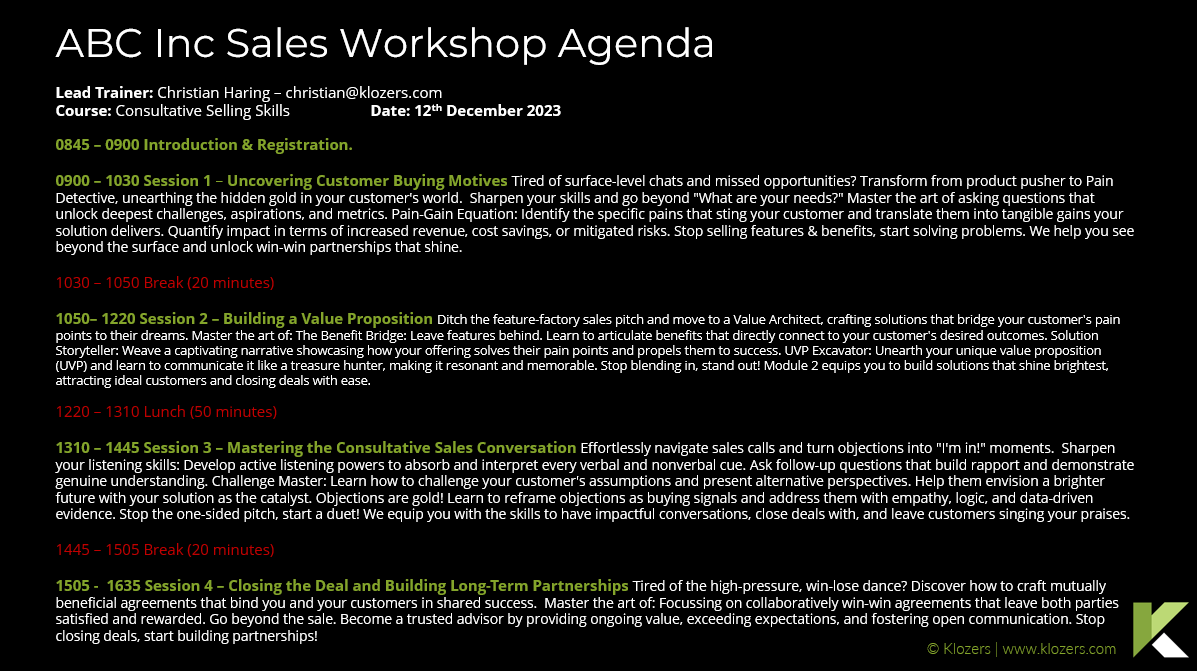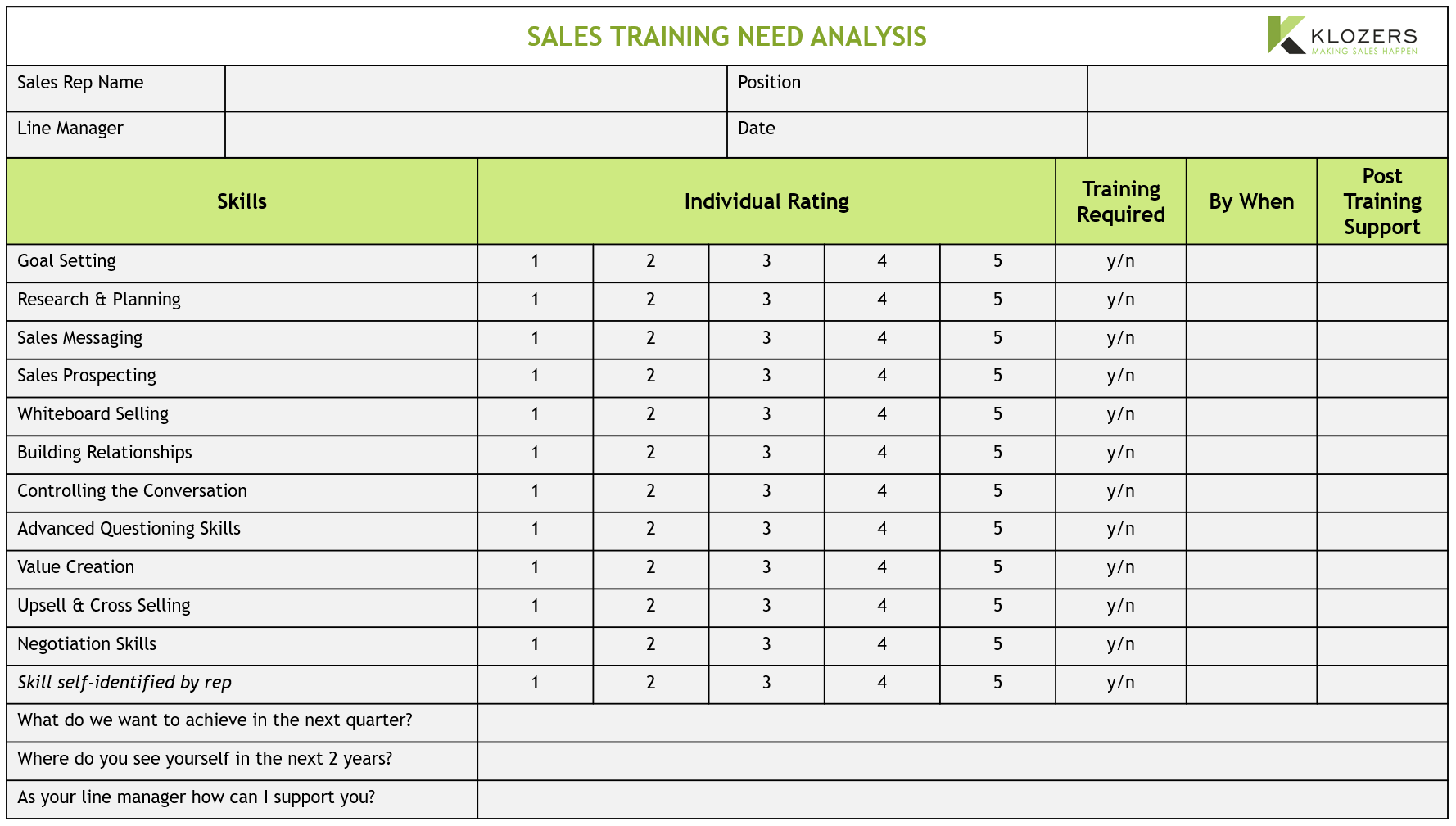There’s a new way to deliver sales growth…
Don’t buy Sales Training until you’ve watched this video…

Here’s the short answer:
Data: Our tailored training programs deliver higher conversion rates and boost employee engagement by.
Call to Action: Download our free guide to designing impactful B2B sales training or schedule a consultation today!
Don’t buy Sales Training until you’ve watched this video…
In the B2B sales arena, where complex solutions meet with complex decision-making, your sales team is the tip of the spear. Their skills, knowledge, and confidence directly impact your win rate and revenue. But with the sales landscape constantly evolving, off-the-shelf training programs might not be the best way forward for you.
At Klozers we are passionate about delivering results, not training. Crazy as it may seem, there are still companies who are buying training so they can tick a box.
Even though we deliver hundreds of our standard sales courses every year, there are times where our clients have a unique situation and benefit from the ability to create a bespoke sales training program. We’ve put together this simple guide to help our customers design and build a customised training program.
This helps ensure they get the most appropriate training content, which in turn, drives genuine business results.
In today’s competitive B2B landscape, having a highly skilled and motivated sales team is no longer a luxury, it’s a necessity. However, simply throwing any old sales course at your reps won’t do the trick. Investing in the best sales training program possible is the key to unlocking their true potential and driving revenue growth.
Why is this so crucial? Let’s delve into the seven key facets of why the right sales training program can be a game-changer for your business:
So, what makes a sales training program the “best”?
There are many factors to consider, but some of the most important include:
By investing in a comprehensive sales training program, you give sales teams the tools they need to succeed. Remember, it’s not just about finding the most popular sales courses or the lowest price. It’s about finding the program that aligns perfectly with your specific business needs and empowers your team to build lasting relationships, win more deals, and ultimately, drive sustainable growth for your company.
Ready to take the next step? Explore the vast array of online and in-person training options available, from top-rated programs like Klozers. There’s a perfect program out there waiting to transform your sales team into a force to be reckoned with.
Remember, the investment you make in sales training today is an investment in the future of your business. Choose wisely, and watch your sales soar!
At Klozers all our courses are modular. This means that each course is made up of either 4 or 8 modules (1 or 2 day courses). These modules can be swapped for other modules at no charge.
Each of our modules last 90 minutes, so on a typical one-day training course we would deliver 2 modules in the morning and 2 modules in the afternoon. This is obviously then replicated for our two-day courses. The 90-minute modules allow time for breaks, and ensure the participants are never overloaded with information in any one session.
We’ve included a course agenda below as an example of what a typical 1 day sales training course would look like:

With Klozers modular framework clients can design and create their own sales training course using any of the modules listed below at for no additional charge. Our modules are based on what we call the four “high value areas of sales” which are Finding, Klozing, Growing and Developing.
Regardless of what industry you are in the more time that your sales reps focus on finding companies/people to sell to, once they find them they have to take the prospect through a process to Kloze them and then once they have done all this hard work they need to Grow and keep their new customer. The last quadrant is “Developing” which is all about continuously developing your sales team in terms of productivity, skills and mindset.
For organisations that need a modules and a course designed exclusively for them, we charge extra for that design time. In terms of costs this varies based on your individual requirements.
This way the course can be up to 100% designed and bespoke to the needs of your organisation.

The training modules listed for each of our sales training courses on the website are the most popular modules for that particular course. Indeed, many companies take our sales training courses as is, however, you are equally welcome to change the modules if you believe there is another module that is more suitable.
In order to ensure that you are choosing the right modules you can follow our simple guide below:
Step 1: Diagnosing your Sales Training Needs
Think of your sales department as a high-performance engine. Before making any adjustments to increase performance, you need a thorough diagnostic. Here’s how you can do this:
Step 2: Architect the Curriculum
Imagine your training as a strategic roadmap, guiding your team from Point A (current state) to Point B (sales mastery).
Step 3: Inject Real-World Relevance
Textbook scenarios rarely capture the dynamic B2B reality. To make your training impactful, inject real-world relevance. So where possible we recommend you include:
Step 4: Accountability
Learning is great, however, implementing what is learned is equally important. It’s vital to consider how you plan to hold the sales representatives accountable to integrating what they have learned into their daily sales behaviours. This should be carried out by the sales leaders in the organisation.
It’s important that their line manager follows up on this after the training in order to hold participants accountable.
Step 5: Measure and Monitor Success
Training isn’t a one-time event. To ensure sustained impact, you need to measure and monitor success:
KLOZERS SALES TRAINING COURSES | KLOZERS SALES TRAINING MODULES (90 mins each) | |||
Sales Fundamentals (Level 100) | Building your Sales Pipeline | Questioning Techniques | Objection Handling Techniques | The Art of Klozing |
AI for Sales (Level 200) | Pre-call Intelligence & Strategic Targeting | Data Driven Negotiation and Deal Structuring | Hyper personalised engagement & Relationship Building | Competitive Intelligence and Strategic Differentiation |
Consultative Selling Skills (Level 200) | Consultative Selling Intro | Building a Value Proposition | Collaborative Problem Solving | Negotiation, Klozing & Customer Success |
Solution Selling (Level 200) | Uncovering Customer Buying Motives | Building a Value Proposition | Mastering the Sales Conversation | Klozing & Building Long Term Partnerships |
SaaS Sales Training (SDRs) (Level 200) | Sales Mindset | Building a Value Proposition | Outbound Sales Prospecting | Needs Assessment Discovery & Qualifying |
SaaS Sales Training (AEs) (Level 200) | Pre-demo Preparation | Selling Value not Price | SaaS Product Demos | Objection Handling Techniques |
LinkedIn Sales Training (Level 200) | Building your LinkedIn Sales Arsenal | The Art of Persuasive Communication | Mastering the Sales Conversation | LinkedIn Sales Navigator |
Telephone Sales Training (Level 200) | Sales Mindset | Building a Value Proposition | Telephone Sales Roleplay | Live Calling with Coaching |
90 Day Sales Planning (Level 100, 200 & 300) | Principals of 90 Day Planning | Creating an Effective Action Plan | Communication & Collaboration | Accountability & Motivation |
Outbound Lead Generation (Level 200) | Building a Value Proposition | Cold Email Outreach | LinkedIn Selling Skills | Telephone Sales Skills |
Inbound Lead Generation (Day 1 of 2) (Level 200) | Introduction and Case Study Review | Strategy and Planning | Creating content that converts | Building High Value Assets |
Inbound Lead Generation (Day 2 of 2) (Level 200) | Technical Requirements and Set up | Selling Online | Measurements & Reporting | Action Planning |
Key Account Management (Day 1 of 2) (Level 300) | Unlocking the Power of Key Accounts | Understanding the Enterprise Landscape | Building Trusted Relationships
| Crafting a Winning Key Account Plan |
Key Account Management (Day 2 of 2) (Level 300) | Sales Negotiation and Deal Structuring | Implementing Your Key Account Strategy | Maintaining and Growing Key Accounts | The Future of Key Account Management |
Sales Negotiation Training (Level 300) | Foundation of B2B Negotiations | Planning & Preparation | Mastering the Negotiation Dance | Beyond the Deal |
Enterprise Sales Training (Level 300) | This course content is customised to meet your exact needs. | This course content is customised to meet your exact needs. | This course content is customised to meet your exact needs. | This course content is customised to meet your exact needs. |
Bespoke Sales Training (Level 100, 200 & 300) | This course content is customised to meet your exact needs | This course content is customised to meet your exact needs | This course content is customised to meet your exact needs | This course content is customised to meet your exact needs |
Sales Management & Leadership (Level 300) | Sales Benchmarking & Improvement Planning | Sales Leadership Styles | Sales Performance & Coaching | Hiring Sales Winners |
This is much simpler and easier than most people think, so here’s an example of these steps in action, and used to design a bespoke “Value Selling” masterclass for a B2B software company with customised modules based on their individual requirements:
Remember, your bespoke sales training course is an investment, not a cost. By crafting unique sales training programs tailored to your unique challenges and opportunities, you’ll empower your sales team to become top sales performers. They’ll not just push products, but become trusted advisors, crafting solutions that perfectly align with customer needs and unlock mutual value. This leads to stronger relationships, higher win rates, and ultimately, sustainable business growth.
The single biggest influence on any B2B sales professional’s success is their immediate line manager. Great managers create great sales reps, but sales management courses can give them the tools and techniques to be truly impactful. Delivering initial training sessions focused on the entire sales cycle, from inbound sales methodology to account management, is crucial. But to ensure your sales teams learn effectively, their line managers need to be on board too.
The right online sales course or onsite training program for sales leaders, ideally before rolling out training to the wider organization, can significantly improve your chances of sales success. Comprehensive courses from Klozers, focusing on business development, customer acquisition, and building trust, can equip managers to lead and support their teams effectively. They’ll learn specific techniques for nurturing leads, developing personal brands, and closing deals, with real-world exercises and actionable insights to solidify their learning.
Our free virtual courses can offer a convenient and accessible starting point for sales fundamentals, while more in-depth courses with sales simulations provide ongoing learning and enhanced user experience. Regardless of the format, choose a program with a similar structure to your sales process, covering aspects like price points, overcoming resistance, and handling objections. Most importantly, it should help managers build trust with their teams and cater to their specific needs.
Leading sales isn’t just about individual performance; it’s about team dynamics and collaboration. Sales team training programs focused on building trust, developing communication skills, and fostering a customer-centric approach can make a significant difference. These programs can teach managers how to effectively build support for new strategies and initiatives, while also providing them with the tools to manage their teams efficiently and mentor individual members.
Remember, the best sales training programs are those that are unique and tailored to your company’s specific needs. Consider factors like your industry, sales process, and target audience when choosing a program. Whether it’s focusing on digital products or mastering complex sales cycles, the right training can equip your sales managers to accelerate your business growth and lead your team to win more deals.
So, invest in your sales management team with the right training. It’s not just about improving individual skills; it’s about building a high-performing sales organization that can consistently attract customers, close deals, and drive sustainable growth.
Here are some additional ideas to take your bespoke training to the next level:
Remember, your sales team is your engine of success – invest in your people, and watch your business soar.
We provide free consultations where you can ask any further questions you might have about specific aspects of creating your bespoke training course. We’re here to help you turn your sales team into sales champions!
“A fantastic learning experience”
Amanda – Account Manager

Iain Swanston has spent over 30 years in B2B sales selling, training and leading teams both domestically and internationally. In addition he serves as an Associate at Strathclyde University Business School where he has delivered the sales content for the Masters in Entrepreneurship since 2015.
107a High Street
Dalkeith
EH22 1AX
United Kingdom
8911 North Capital of Texas Highway, Suite 4200 #1154
Austin, TX 78759
United States
Klozers
Ground Floor
470 St Kilda Road
Melbourne VIC
3004